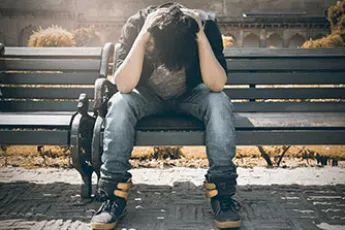Mental and Emotional Health Among Youth Experiencing Homelessness
Youth experiencing homelessness face mental and emotional health challenges from their time unhoused. Empathic care can set them on a path to healing.

1 in 5 youth in the U.S. will have a mental disorder that significantly impacts their life.
Half of all mental illnesses start by age 14, and 75% by mid-20s.
Suicide is the 2nd leading cause of death for 10 to 34 year olds in the U.S.
Mental Health and Youth Homelessness
Youth who experience homelessness have significantly higher rates of emotional, behavioral, and immediate and long-term health issues. In fact, 69% of youth experiencing homelessness report mental health challenges. Suicide is the leading cause of death among youth experiencing homelessness, and these youth report high rates of suicide attempts.

Substance Use
Young people experiencing homelessness face higher rates of alcohol and drug use. For many, substance use offers a means of escape from the physical and emotional trauma associated with life on the streets.
Substance use among young people experiencing homelessness has been reported as two to three times higher than that found among non-homeless young adults. About 10% of youth will be diagnosed with a substance use disorder in their lifetime, yet 29% of youth experiencing homelessness report having substance use problems.

Mental Health by the Numbers at Covenant Home
Our sites have mental health counseling, licensed clinical social workers, and/or psychiatrists on staff to help young people process trauma and begin their journey to healing.
Each year, around 4,100 youth engage in on-site mental health services annually.
More than half of our residential youth report a mental health issue at intake.
An even higher percentage of LGBTQ+ youth report a mental health issue at intake.

“At Covenant Home, I found structure and support. And I learned to talk about my depression without shame. I learned that mental illness, like any other illness, can be treated. My eyes and my heart were opened up to so many different experiences."
Carlos Salazar, Covenant Home California AlumnusMental and Emotional Health News and Insights
All news & insightsKnow the Issues That Drive Youth Homelessness
Young people experiencing homelessness face numerous challenges that hinder their ability to become independent, successful, and fulfilled adults.

Human Trafficking
Traffickers use violence, threats, deception and other manipulative tactics to trap millions of people worldwide. Children and youth experiencing homelessness are a prime target of this criminal industry.

Income Inequality/Poverty
Children raised in poverty face a higher risk of homelessness. Without equitable resources, they can get swept up in a vicious cycle of hardship and significant social disadvantages.

Gaps in Foster Care
When young people age out of foster care and other child welfare services, they become susceptible to homelessness, human trafficking, and other threats to their well-being.

Lack of Affordable Housing
Affordable housing is in short supply across the cities and countries where we serve young people facing homelessness. A low supply of housing pushes more young people to live in unsafe places, couch surf, or rely on those who would take advantage of them in exchange for a place to sleep.

Mental and Emotional Health
Youth experiencing homelessness face mental and emotional health challenges from their time unhoused. Each year, thousands of youth experiencing homelessness die on the streets due to illness, assault, or suicide.

Racial Discrimination
Racial discrimination is a pipeline to youth homelessness. People of color experience homelessness at higher rates, largely due to long-standing structural racism that impacts education, housing, and other inequities.
Help Youth Facing Mental and Emotional Challenges
Your support will ensure that young people experiencing homelessness will receive the support they need to face mental and emotional health challenges.


